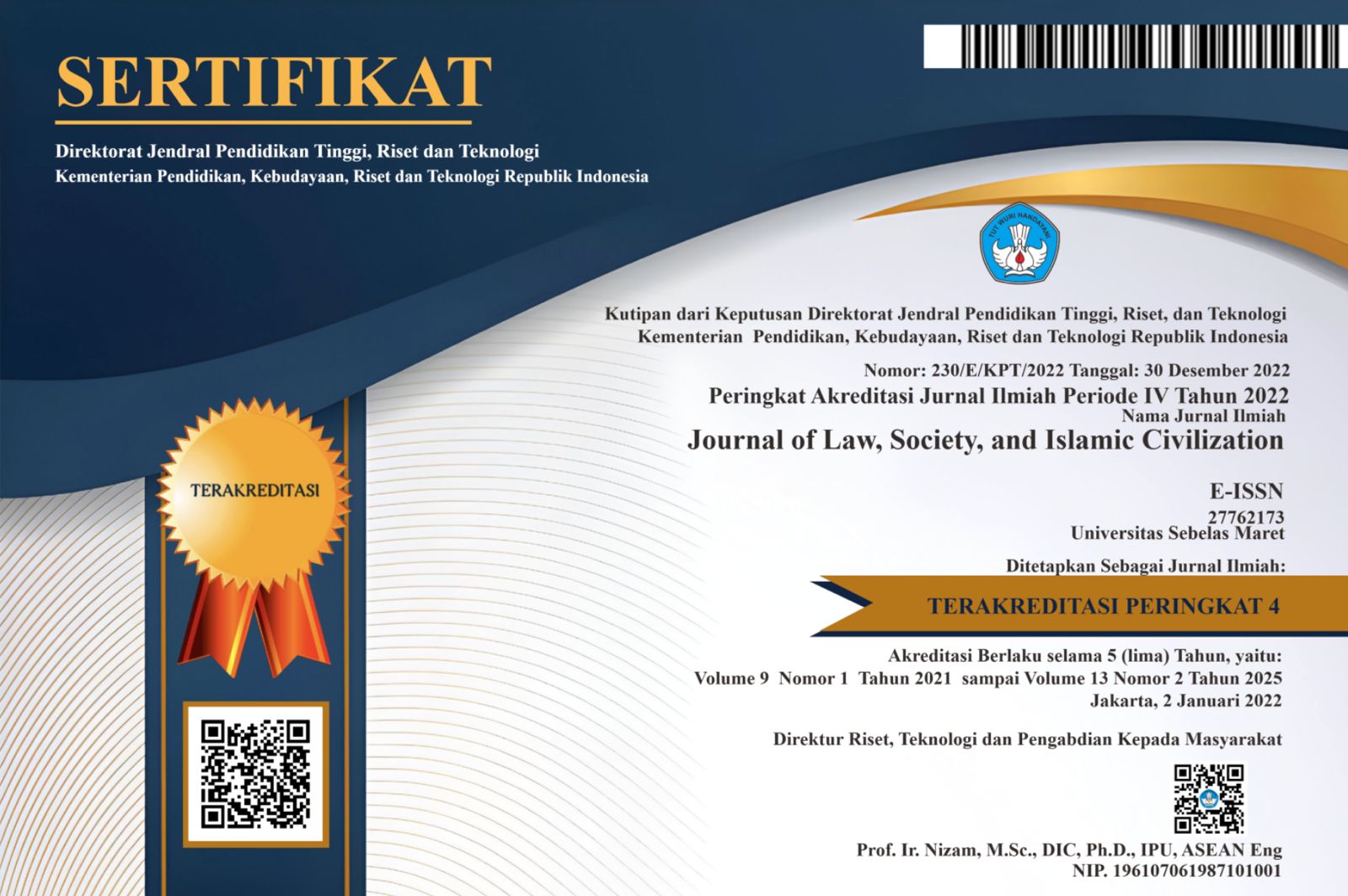Application of Academic Papers in Formulation Legal Products at the Regional
Abstract
Keywords
Full Text:
PDFReferences
Ahmadi, A. (2018). Kontriversi Penerapan Hukum: Telaah Sintesa Hukum Represif, Hukum Otonom dan Hukum Responsif. Al-'Adl, 9(1), 1-18.
Anggono, B. D. (2018). Tertib Jenis, Hierarki, dan Materi Muatan Peraturan Perundang-Undangan: Permasalahan ddan Solusinya. Masalah-Masalah Hukum, 47(1), 1-9.
Astawa, I. G. P., & Na’a, S. (2008). Dinamika Hukum Dan Ilmu Perundang-Undangan Di Indonesia. Bandung: Alumni.
Balitbang Hukum dan HAM. (2021). Pentingnya Naskah Akademis Sebagai Dasar Peraturan Perundang-Undangan Yang Menyejahterakan Masyarakat. Balitbangham.Go.Id. Last modified 2021. Accessed in Februari 2, 2022. https://www.balitbangham.go.id/detailpost/pentingnya-naskah-akademis-sebagai-dasar-peraturan-perundang-undangan-yang-menyejahterakan-masyaraka.
La Ode Bariun, S. H., MH, H., & SH, M. (2020). Panduan Penyusunan Naskah Akademik Rancangan Peraturan Daerah. Penerbit Lakeisha. Klaten: Penerbit Lakeisha.
Basyir, A. (2014). Pentingnya Naskah Akademik Dalam Pembentukan Peraturan Perundang-Undangan Untuk Mewujudkan Hukum Aspiratif Dan Responsif. Jurnal IUS Kajian Hukum dan Keadilan, 2(5), 285-306.
Giri, N. P. N. S. (2016). Lembaga Negara Pembentuk Undang-Undang. Jurnal Komunikasi Hukum (JKH), 2(1), 84–93.
Arianto, H. (2010). Hukum Responsif dan Penegakan Hukum di Indonesia. Lex Jurnalica, 7(2), 115–123.
Lathif, N. (2017). Teori Hukum Sebagai Sarana Alat Untuk Memperbaharui Atau Merekayasa Masyarakat. PALAR (Pakuan Law review), 3(1), 73–94.
Muntaqo, F. (2005). Hukum Sebagai Alat Rekayasa Sosial dalam Praktek Berhukum di Indonesia. Jurnal Hukum Progresif, 2(1), 71.
Muslimah, S. (2021). Politik Hukum Program Legislasi Nasional Dalam Pembentukan Undang-Undang. Universitas Hasanuddin: CV Cahaya Arsh Publisher & Printing.
Nalle, V. I. W., & Kristina, J. (2020). Tantangan Penerapan Analisis Dampak dalam Legislasi Indonesia. Veritas et Justitia, 6(1), 127-149.
Nonet, P., & Selznick, P. (2009). Law and Society in Transition : Toward Responsive Law. New Jersey: Transactional Publisher.
Kurnia, P., & Mahendra. (2007). Pedoman Naskah Akademik PERDA Partisipatif. Yogyakarta: Total Media.
Rambi, R. M. A. (2016). Kedudukan dan Fungsi Naskah Akademik Dalam Pembentukan Peraturan Daerah Kabupaten/Kota Menurut UU No. 12 Tahun 2011. Lex Crimen, 5(4), 22–30.
Seidman, A., Robert, B., Seidman, & Abeyesekere, N. (2001). Legislative Drafting for Democratic Social Change. London: Kluwer Law International.
Senastri, N. M. J., & Suryani, L. P. (2018). Fungsi Naskah Akademik (NA) Dalam Pembentukan Rancangan Peraturan Daerah. Kertha Wicaksana, 12(1), 38-45.
Sirajudddin. (2015). Legislative Drafting, Pelembagaan Metode Partisipatif Dalam Pembentukan Peraturan Perundang-Undangan. Malang: Setara Press.
Sofwan, S., Rusnan, R., & Amalia, R. A. (2022). Pentingnya Naskah Akademik Dalam Penyusunan Peraturan Daerah. Jurnal Diskresi, 1(1), 1–16.
Supriyanto, E. (2016). Kedudukan naskah akademik dalam penafsiran ketentuan-ketentuan dalam undang-undang. Yuridika, 31(3), 384-400.
Suska, S. (2012). Prinsip Regulatory Impact Assessment Dalam Proses Penyusunan Peraturan Perundang-Undangan Sesuai UU Nomor 12 Tahun 2011. Jurnal Konstitusi, 9(2), 357-380.
Yasin, A., & Amaliyah, D. (2022). Urgensi Naskah Akademik Dalam Pembentukan Sebuah Peraturan Daerah Yang Partisipatif. Jurnal Pendidikan Dasar dan Sosial Humaniora, 1(9), 1971-1978.
Yuliandri. (2011). Azas-Azas Pembentukan Peraturan Perundang-Undangan Yang Baik, Gagasan Pembentukan Undang-Undang Berkelanjutan. Jakarta: PT. Raja Grafindo Persada.
Refbacks
- There are currently no refbacks.












